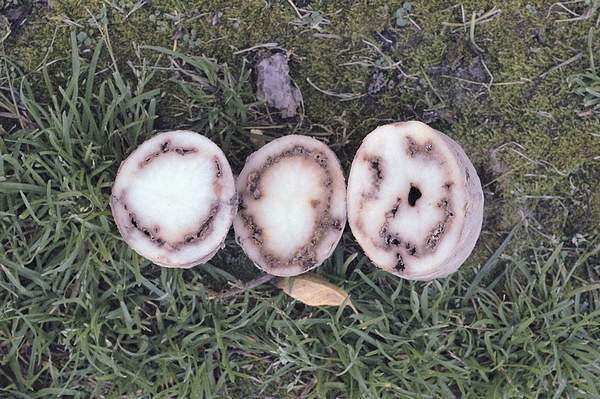IDAHO FALLS, Idaho — The head of Idaho’s potato seed certification program says growers appear to have made progress in controlling bacterial ring rot challenges, and their potato virus Y infection rates seem to have flattened.
Alan Westra, area manager of the Idaho Crop Improvement Association, based his observations on early numbers from ongoing seed certification testing.
In 2014 — following a ring rot flare-up — Idaho implemented rules governing the devastating pathogen, including mandatory testing of seed lots seeking certification or recertification. The association has zero tolerance for ring rot, rejecting any seed lots in which the disease is found. Officials also seek to trace the origin of infections.
Westra said ring rot laboratory testing and field inspections eliminated 1,700 acres from the certification program in 2015. He said results from 64 percent of 2016 seed lots required to undergo testing are in, and just 10 acres have been eliminated.
“So far, it’s down considerably from what it has been in the last three years,” Westra said. “Hopefully, it’s due to the fact that we’ve been testing, plus the industry at large is doing a better job between all of the other testing that’s done outside of the program and a greater attention to sanitation.”
The program also calls for swabbing of equipment to gauge effectiveness of sanitation. Westra said growers did a good job of sanitizing seed cutters — often implicated in spreading ring rot — but the bacteria was frequently found in unexpected places, including pilers and conveyors. Ring rot also surfaced often on the rubber belts that move spud piles in potato trucks. He said one commercial trailer that was swabbed also tested positive for ring rot, indicating growers shouldn’t assume ring rot originates from seed and that it is truly an “industry-wide problem.”
The certification program also plants tubers from Idaho seed lots in Hawaii to test for PVY, which is spread by aphids. Of the 2015 seed, half of the lots had no confirmed PVY. Westra said 67 percent of acres were eligible for recertification through the program for having less than 2 percent PVY.
“I expect the levels to be about the same,” Westra said, adding final testing and retesting of the 2016 crop is still taking place.
Westra said PVY infections have been roughly flat during the past four years.
Westra has also emphasized training his workers to properly score the “blackleg” symptoms of Dickeya dianthicola, a bacterial pathogen that has been spreading in many U.S. potato production areas. Westra said other states are now “catching up” to Idaho, which has long-established tolerances for blackleg, and the disease hasn’t yet posed a serious concern in the Gem State.
“We want to make sure we’re on top of this before we have a problem develop,” Westra said.
Source: Capital Press











